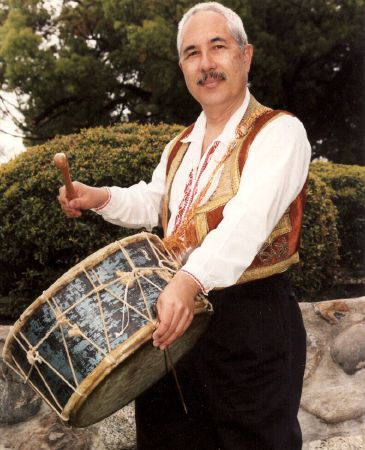
Richard Unciano was born into a multi-ethnic family and raised in Los Angeles Califronia. Since childhood, he was deeply immersed in several local ethnic communities. His first exposure to these traditions as a child was through his mother, a lifelong enthusiast of Russian and Hungarian Roma music since the 1920’s, and through his neighborhood friends, most of them Armenian.
Richard attended the University of California at Berkeley on a full academic scholarship, majoring in Sociology and Engineering Physics. After graduating from Berkeley, he spent the next two years working in San Francisco.
To increase and improve his learning and understanding of folk music and traditions, Richard undertook three field research expeditions; 1964, 1967, and 1970 for a total of 23 months. He began teaching the material he learned after his first two tours in 1967.
On his expeditions Richard had the opportunity, and the honor, of working with many prestigious institutions, such as the Academy of Athens, the Bulgarian Academy of Sciences, or the Serbian Ethnographic Institute, and many other organizations and universities. He also had the distinction of learning under the tutelage of famous teachers such as Vasileos Papachristos of Thessaloniki, Greece, or Radmila Petrovic of Belgrade, Serbia. Richard was most fascinated, however, by the people that lived out in the countryside and in the villages, and he attended weddings, parties, and gatherings where the most genuine versions of the dances and the music were performed.
Richard taught and made presentations at hundreds of sites in the Los Angeles area including eight school districts, in festivals, and many other types of celebrations and gatherings. And he taught courses all over Southern California, such as LA City College, Cal-Poly, Mount San Antonio College, Rio Hondo College, Riverside Community College and many more. His teaching ranged from San Diego, to San Francisco, to Las Vegas. Professionally, Richard worked as an engineering planner, production scheduler, materials buyer, and stock market analyst.
In 1969, Richard founded a folk dancing group called Koroyar that very quickly grew into a large performing ensemble, presenting themselves in many folk dancing venues around the LA basin and in the Inland Empire. During this same period, Richard met Ron Muller, a dancer and performing musician with prodigious musical talents such as perfect pitch, and an amazing ability to listen to the field recordings and records that Richard had brought back from his trips and notate them perfectly with every detail of the complex meters and elaborate melodic sequences, including all the improvised embellishments typical of Eastern European music. With this invaluable assistance, Richard and Ron were able to add the live music component to the Koroyar performance repertoire. Both Richard and Ron continued to perform with Koroyar for the rest of their lives.
Richard had many singular accomplishments during his life such as being made an honorary member of the “Efxinos Leshi” Pontian Dance Group of Thessaloniki, Greece, being an honorary judge at the 1964 “Trakiia Pee” Folk Festival at Stara Zagora in Bulgaria, providing the music, costumes and dance for the “Simka’s Wedding” episode of the TV show Taxi, serving on the Los Angeles Mayor’s Council for International Visitors and many more.
Richard was very concerned about the preservation of folk traditions in Europe that were on the verge of extinction, such as the Crimean Tatars for example, and did his personal best to document them. He was also an author, penning eighteen articles about folk music, dance and other traditions, such as; "Bar hopping in Turkey," "An Introduction to the Dances of Ezrum Province," "Gankino, Kopanitsa, and More in 11/16."
Richard succumbed to colon cancer on April 8, 2006, and is survived by his four children, Silvan Zitsa, Tigran Sarkis, Tatiana Elena, Arianna Danielle, who are all college graduates.